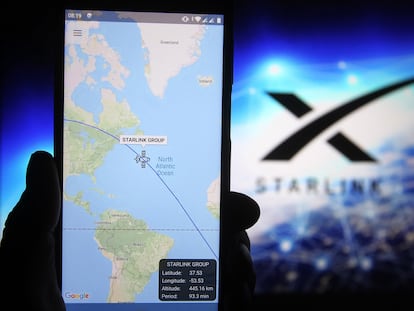Star Wars: the not-so-phantom menace
Space is increasingly critical to modern life on Earth. But there is growing concern that as it becomes more economically and strategically important, it is fuelling an arms race that could have devastating consequences for humankind

Many facets of modern life for billions of people on Earth depend on space technology. Space objects such as satellites enable services like communications, navigation, weather forecasting, environmental monitoring and disaster response, to name but a few.
Dozens of governments and commercial entities are designing, building and putting objects into space. Among them is Spain, which is a founding member of the European Space Agency, and played a key role in several of Europe’s flagship missions, such as Galileo, Copernicus and Rosetta.
To ensure space’s continued contribution to humankind’s wellbeing, spacefaring nations must work to arrest their weaponization of outer space
Humanity’s reliance on space is set to grow, and not just for relatively wealthy countries like Spain. Indeed, achieving the 2030 Sustainable Development Goals depends on space-based technologies in one form or another. For example, space-based technology can play a major role in dealing with future pandemics by strengthening preparedness, improving surveillance and providing effective early warning of disease outbreaks. Space can also help address climate change, forecast natural disasters and support disaster management when such events do occur. As such, billions of people around the globe stand to benefit from the peaceful use of space in terms of their health, wealth and wellbeing.
The picture isn’t all rosy, however. Due to the critical importance of space, several countries have, in recent years, formed “space forces” and are developing national doctrines for fighting in space. A handful of nations have even tested offensive capabilities of various kinds.
The risks of weaponizing space
These countries have some legitimate security concerns. The problem is this pattern of responses to the actions and activities of space competitors is fuelling an arms race. If the international community doesn’t act to turn down the dial on space’s quickening weaponization, humankind risks suffering the devastating consequences of a space-based conflict, such as mass disruption of services like GPS and denial of internet access. Debris from the destruction of space objects could also prevent space users from using orbits, possibly for years.
States have long sought to ensure that outer space is used only for peaceful purposes. Even at the height of the Cold War, they reached international agreements such as the 1967 Outer Space Treaty that, among other things, indicates that states shall not “place nuclear weapons or other weapons of mass destruction in orbit or on celestial bodies or station them in outer space.” These treaties have contributed to safety and security in space and on Earth, but as technology advances so does the risk of conflict in space.
Counterspace capabilities have the capacity to interfere, incapacitate or destroy adversaries’ space assets, and some of them are commonly used nowadays, such as cyberattacks and electronic interference with satellites. Others, such as interceptor missiles launched from Earth to attack space objects, could be used during a conflict on Earth, and would have a crippling effect on militaries and civilians alike.
Even if specific space technologies were not invented with a counterspace purpose in mind, their characteristics nevertheless could make them a threat in the eyes of others. An example of this is the so-called space harpoon, a barbed projectile fired from a satellite to collect space junk, which could be exploited for hostile purposes. In the face of such strategic unpredictability, trust deficit grows and tensions escalate more easily.
Averting the further weaponization of space
For decades governments have argued about “preventing an arms race in outer space” in multilateral forums like the Geneva-based Conference on Disarmament. Now the space arms race is here – and given what is at stake – governments need to focus afresh on practical steps to provide each other meaningful reassurance about their capabilities and intentions in space. There are already several proposals. China and Russia have proposed a treaty to prevent weapons from being placed in space and threats against space objects. Other, predominantly Western governments, have proposed “reducing space threats through norms, rules and principles of responsible behaviors.” These approaches are not mutually exclusive. Arms control history suggests legal and normative measures can be combined and sequenced in ways that are mutually reinforcing.
Even then, it’s unlikely these measures will be sufficient to ensure the safe and secure use of space in the future. Measures to increase transparency and confidence in space-related activities to minimize misunderstandings are also required. This could be augmented by the publication of national policies on counterspace capabilities and by encouraging dialogue between space users – including commercial stakeholders – about the impacts of and risks introduced by new strategic technologies. Greater mutual understanding of these issues among space users could help to avoid escalatory situations.
Space is critical for sustaining and enhancing life on Earth. It actively contributes to sustainable development in a myriad of ways. To ensure space’s continued contribution to humankind’s wellbeing, spacefaring nations must work to arrest their weaponization of outer space and develop safeguards to prevent current tensions blowing out into full-blown conflict, thus keeping Star Wars firmly in the realm of science fiction.
Almudena Azcárate Ortega is an associate researcher, John Borrie is a senior research fellow and James Revill is the program lead of the Weapons of Mass Destruction and Other Strategic Weapons Programme of the United Nations Institute for Disarmament Research.
Tu suscripción se está usando en otro dispositivo
¿Quieres añadir otro usuario a tu suscripción?
Si continúas leyendo en este dispositivo, no se podrá leer en el otro.
FlechaTu suscripción se está usando en otro dispositivo y solo puedes acceder a EL PAÍS desde un dispositivo a la vez.
Si quieres compartir tu cuenta, cambia tu suscripción a la modalidad Premium, así podrás añadir otro usuario. Cada uno accederá con su propia cuenta de email, lo que os permitirá personalizar vuestra experiencia en EL PAÍS.
En el caso de no saber quién está usando tu cuenta, te recomendamos cambiar tu contraseña aquí.
Si decides continuar compartiendo tu cuenta, este mensaje se mostrará en tu dispositivo y en el de la otra persona que está usando tu cuenta de forma indefinida, afectando a tu experiencia de lectura. Puedes consultar aquí los términos y condiciones de la suscripción digital.









































